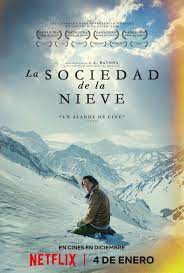
THE SOCIETY OF THE SNOW
Spain/Chile/Uruguay, 2024, 144 minutes, Colour.
Enzo Vogrincic, Agustin Pardella, Matias Recalt, Fernando Contingiani.
Directed by A.J. Bayona.
The title comes from a book written about a significant disaster of 1972. It was the plane crash in the Andes, the plane carrying members of the Uruguayan rugby team and those associated with the team. The crash was in October, spring in the southern hemisphere, still a great deal of snow in the mountains, but beginning to thaw and melt.
In the immediate aftermath of the tragedy, there was a low-budget Mexican film version, Survive, directed by René Cardona, dismissed by some of the time as exploitation, but, within its framework, offering a competent dramatising of what happened.
British writer, Piers Paul Read, wrote a novel which was filmed in 1993 by Frank Marshall, Alive, starring Ethan Hawke. This was well received at the time, the look of the characters, their means for survival, the issue of cannibalism for survival – and some mystical aspects, especially the opening with John Malkovich sitting on a mountain meditating, and flesh for life with its Catholic Eucharistic overtones.
Writer-director, A.J. Bayona, Spanish, made his reputation with The Orphanage but then showed his ability to direct disaster films with The Impossible, on the 2004 tsunami. He also directed one of the Jurassic Park films.
Society of the Snow was Oscar-nominated, international film and a nominee for make up.
The film introduces the members of the team, jovial young people, the flight, a close-up of the crash and what was happening in the cabin, the survivors in the snow, radio not working, the cold, the limits of food, the isolation – but their working together, forming a society of the snow.
Some of the characters are more strongly drawn than others, especially Numa, offering a voice-over response to the tragedy and survival, even after he succumbs and dies. The number of days are listed, the audience sharing the cumulative effect of trying to survive, avalanches burying the fuselage, climbing out, but also the increasing number of dead whose names and ages on screen.
Audiences may know of the outcome but still interested in decisions made, improvising, facing the issue of survival and eating the flesh of their friends, articulated in the conversations, discreetly presented visually. And, the final walk out of a small group, found, and then the rescue effort.
This kind of film can be very harrowing as it invites the audience to share in the experiences. Comparisons might be made with films about the rescue of the Thai boys in the flooded caves in 2018, 13 Lives, as well as with The 33, the film about the ordeal of the miners buried underground in Chile, 2010, and the combined effort to drill down, and to rescue the men.
- Actual events of 1972? The Uruguayan rugby team? The crash in the Andes? The deaths, the survival for over two months, issues of survival, food?
- Cinema experience? The locations, filming in the mountains, filming its studios, the plane and its interiors? The musical score?
- Memories of previous films, Survive, Alive? This film half a century after the events?
- The title, the book about the event, the focus on the survivors, the way they survived, form a unity, a society?
- The background, the rugby team, success, South American games, Uruguay, the enthusiasm of the team, those associated, at the airport, photos, enthusiasm? The age of most of the passengers, in their 20s?
- The introduction to characters, by name, place in the team, the enthusiasm of the flight, chatter, relationships?
- The staging of the crash? The wind, the snow, turmoil inside the cabin, the crash landing, the fuselage, the tale separated, the initial deaths, injuries?
- Numa and his narrative, his observations, his own strict ethical perspectives, conflict with the cannibalism? His gradual change, accompanying the expedition out, his infected leg, return, preparation for death, his note about no greater love than laying down life for friends? His death?
- The other characters, the immediate impact, injuries, dealing with them? The search for food, clothing? The radio not working? The cold, the wind, the snow, the avalanche, burying the plane, digging themselves out, oxygen coming in? The dramatising of the various crises over the days?
- The impact on each of the characters, psychological, emotional, religious background? The older couple?
- The issue of the food, the issue of cannibalism, immediate reactions, hunger, decisions made, the private slicing of the flesh, the distribution, the eating, refusals, changes over time? Survival?
- Group exploring, finding the tail, the radio, cigarettes and food, waterproof?
- The plan to walk out of the mountains, the key characters, their backgrounds, Roberto and his leadership, football skills? Age? Numa walking out with them, the infection, his return? The others returning after finding the tail?
- The growing number of deaths, the listing of the names on screen, the ages?
- The decision to leave, the group, one returning, to preserve the food? The trek, on top of the mountains, climbing the mountains, making a self in the snow for the night? Persevering?
- The Valley, the flowing water, some vegetation, the man with the horse, the communication, headquarters, the message, the location, the reading of each name twice? The three survivors, food, shelter?
- The radio, the stranded group hearing the news, their hopes?
- The strategies, the helicopters, the packing, people aboard, the reunions, the group emaciated, food, medical checks, showers cleaning the mud, the spirit of the survivors? The happiness of the families?
- The insertion of actual footage from the newsreels of the times? The photos?
- An epic experience of heroism and survival?